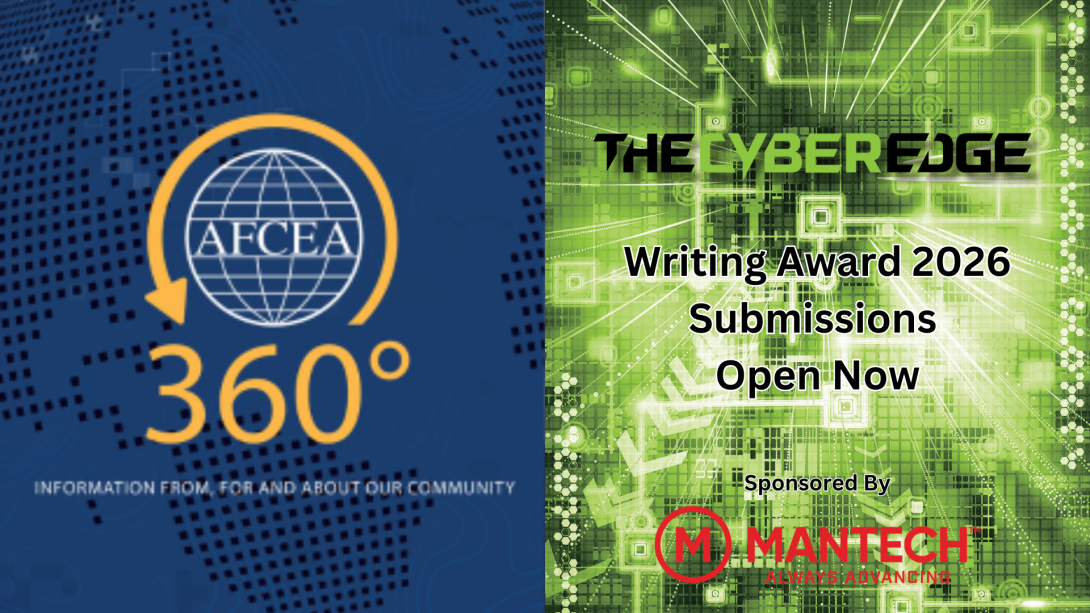The Cyber Edge Writing Award 2026 Opens for Submissions
AFCEA International’s The Cyber Edge Writing Award is back for its seventh cycle and is now open for submissions until February 23, 2026.
With the theme of “Securing the AI-Driven Future: Defense and Offense in the Age of Generative Intelligence,” contest judges are looking for thought leaders to delve into the complexities of combining artificial intelligence (AI) with cybersecurity strategies and to suggest the best path forward as the United States navigates emerging technologies.
Generative AI (GenAI) is changing the global cybersecurity landscape. AI-generated phishing campaigns, deepfake disinformation, automated malware and autonomous cyber attacks are a few of the many ways adversaries are using GenAI to disrupt and deceive at scale.
The integration of GenAI in military operations can be leveraged to the United States’ advantage, but it also opens the door to more sophisticated and large-scale threats. Military leaders, national defense agencies and critical infrastructure sectors must continue developing strategic cybersecurity responses to the evolving threats to help the United States and allied nations defend sensitive systems, develop AI-enabled deterrents and establish clear rules of engagement in cyberspace.
“We're incredibly grateful for the participation of AFCEA's cyber and intelligence committees in helping us select this year's theme,” said Nuray Taylor, SIGNAL Media senior reporter and special projects manager. “Not only is it timely, but it's integral in the development of strategic operations in the modern age. The world as we know it is changing, and the AI revolution is rapidly leading us down various unknown paths. It is therefore up to today's critical thinkers—who we hope participate in the 2026 TCE writing award—to guide us to the safest destination.”
SIGNAL Media is searching for submissions that explain how GenAI is transforming cyber threats across defense, intelligence and infrastructure; propose technical, policy-based or operational solutions that could strengthen national security; and illustrate the implementation plan in military, government or industry environments.
Due to the wide variety of ways GenAI is influencing cyber warfare, writers can approach topics ranging from offensive cyber capabilities enabled by GenAI to defensive strategies that protect national innovation pipelines from AI-enabled IP theft and cyber espionage.
Other topics to consider include, but are not limited to, AI-powered military defense systems, securing the different critical infrastructure sectors, legal and ethical frameworks for AI in cyber operations and digital warfare, AI-enabled resilience in command and control systems, public-private collaboration to counter GenAI-enabled threats and developing workforce strategies and cyber education programs to address this new era of AI.
Submissions must be between 1,200 and 1,600 words, follow the journalistic Associated Press writing style and be written for an intended audience of senior leaders, decision-makers and cybersecurity professionals in the military, defense and national security industries, and research institutions.
While the theme is about GenAI, submissions should be written with minimal use of GenAI tools and must contain original and unpublished content. Articles that appear to be AI-generated may be disqualified.
The top three authors will see their articles published in SIGNAL Magazine. First place receives $5,000; second place receives $2,000; and third place receives $1,000.
All members of industry, academia, the government and military are eligible to enter the contest; however, AFCEA employees, their immediate families and employees of the contest sponsor MANTECH are not allowed to submit.
Submitted articles may be co-authored, but only one prize will be paid.
Learn more about submission guidelines and rules, and submit your article today.





Comments